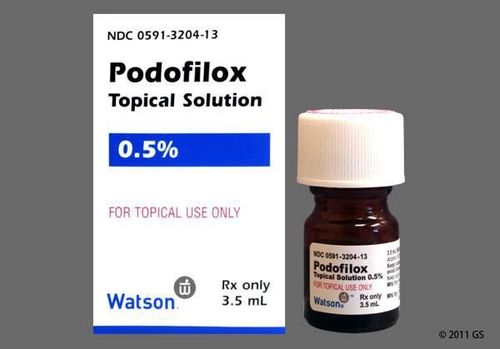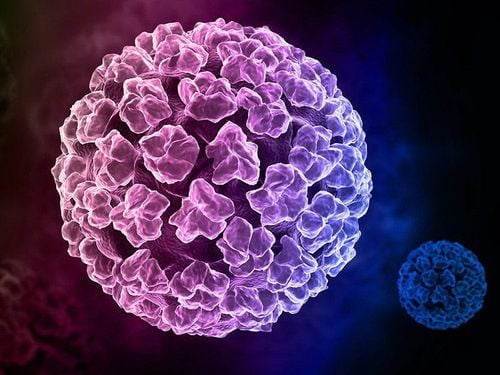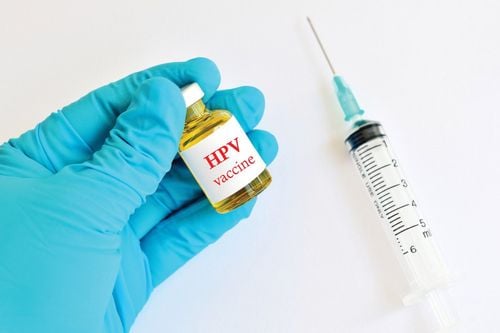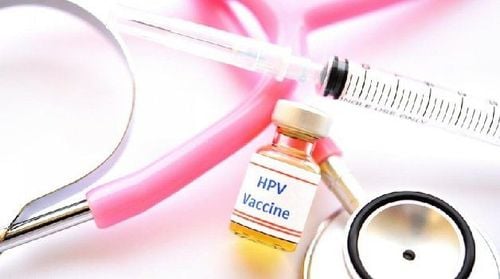This is an automatically translated article.
Articles by Master, Doctor Phung Quang Thuy - Obstetrician and Gynecologist - Department of Gynecology - Vinmec Times City International Hospital
HPV virus also known as Human papillomavirus. This is a human papillomavirus that causes warts on the skin, genitals, and some forms of cancer. The HPV virus has many different forms, so it can cause many diseases that affect human health.
1. How can everyone get HPV?
People can get HPV if their mouth or genitals touch the genitals of an infected person. This mainly happens through oral, vaginal or anal sex. But HPV can also be spread through close genital-to-genital contact, even without having sex.
People who have had many sexual partners are more likely to get HPV and in fact many people with HPV are unaware that they have the infection. Therefore, it is very easy to spread the disease without them even realizing it.
Some types of HPV cause genital warts, but many people do not have any symptoms when they are infected with this virus. Usually, the infection goes away on its own, but in some people it doesn't go away. If this happens, it can develop into a variety of conditions.
2. What are the risks of HPV infection?
People with long-term HPV infections have a higher risk of other health problems. Different types of HPV virus can cause different problems, for example:
● Genital HPV infection can cause cervical (cervical) cancer, vagina (vaginal cancer) vagina) or penis (penile cancer). Other types of HPV can cause genital warts.
● HPV infection around the anus can cause anal cancer (anal cancer).
● An HPV infection in the mouth and throat can cause cancer of the mouth and throat.
These problems often occur many years after a person is first infected.
3. How is HPV infection diagnosed and treated?
If your doctor diagnoses you with genital warts, this means you have an HPV infection. However, not all viruses cause cancer. Therefore, doctors recommend that women should perform cervical cancer screening.
In most cases, this involves getting a regular Pap test (sometimes called a "Pap smear") starting at age 21. They may also have an HPV test at this time. Sometimes, the HPV test alone is ordered by doctors to screen for cervical cancer. In fact, there is no test to check for genital HPV infection in men or HPV infection in the mouth or throat.
So when diagnosed with HPV virus infection, how will it be treated? Once you've been diagnosed with an HPV infection, you can't get rid of it with medication, the doctor said. If an HPV infection leads to a more serious problem, your doctor can talk to you about treatment options.
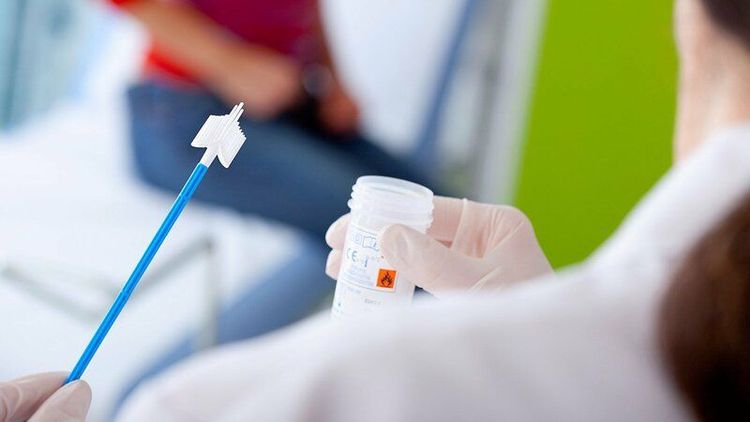
4. Can the HPV virus be prevented?
The answer is yes. For most people, the best way to protect against HPV is to get vaccinated against HPV. The vaccine only works if it is given before a person is infected with the virus. This is why doctors recommend getting vaccinated at a young age. Doctors recommend that children 11 to 12 years old get the vaccine, but it can be given as early as age 9 and up to age 26. In some cases, vaccines can also help older people.
Vaccines are very good at preventing the types of HPV infections that can cause cervical and vaginal cancer. Besides, it can also reduce the risk of other types of cancer. In particular, the vaccine is also very good at preventing the HPV viruses that cause genital warts.
Condoms do not completely protect you from HPV. That's because the virus can live on skin not covered by a condom. But condoms are still an important way to protect yourself from other STIs.
Watch now: HPV and cervical cancer
5. Cervical cancer screening tests
Screening tests ordered by your doctor to find cancer cells in the cervix. The cervix is the bottom part of the uterus where it meets the vagina.
Screening tests also look for cells that can turn into cancer, called "precancerous". They can find cervical cancer and pre-cancer in its early stages, when it can be treated or even cured.
Some of the tests used to perform cervical cancer screening are:
Pap test: This is the most commonly used test for screening. It is sometimes called a "cervical cytology test". The test involves taking cells from the surface of the cervix and sending them to a laboratory. A specialist will then look at the cells under a microscope to see if they are abnormal. HPV test: This is the virus that causes cervical cancer. An HPV test involves examining cells from the cervix for certain types of HPV virus. Combination test: This test involves doing a Pap and HPV test at the same time. For both types of tests, your doctor will need to take cells from the surface of your cervix. To do this, they will gently insert a device called a "speculum" into your vagina. This device helps push the vaginal walls apart so the doctor can see the cervix. They will then use a small tool to gently scrape cells on the surface of the cervix. This tool looks like a small spoon or brush. This can be uncomfortable, but is usually painless.
6. When should cervical cancer screening begin?
Most experts recommend that women start having a Pap test at age 21. Your doctor may also recommend an HPV test instead of a Pap test starting at age 25. But this option may not be available in many places. Your doctor or nurse can talk to you about your options.
You should start getting a Pap test at the recommended age, whether you've been sexually active or not. Also, you don't need to start cervical cancer screening before age 21, even if you became sexually active at a younger age.

7. What should be done to prepare for a Pap or HPV test?
You don't need to do anything special to prepare. Sometimes people hear that they shouldn't have sex or put anything in their vagina for 2 days before a Pap test. This isn't necessary, however, the fact that the Pap test still works well even if you've had sex recently.
Your doctor can schedule you to have the test done, even on the day you're on your period. Screening can often still be done even if you are bleeding. Your doctor can talk to you and tell you what to do.
8. How often should I be screened for cervical cancer?
That depends on your age and previous Pap test results.
If you are 21 to 29 years old, you should have a Pap test every 3 years. Or if your doctor recommends an HPV test, you should get tested every 5 years, starting at age 25.
If you are 30 years or older, you can have a Pap test every 3 years. Other options are an HPV test every 5 years or a combined Pap and HPV test every 5 years.
If you are 65 or older, you can stop having a Pap test if:
You have had regular Pap tests until you turn 65. You have had 3 normal Pap tests in a row or 2 tests. Normal combined Pap and HPV tests in the last 10 years (with most recent test within the last 5 years) You may also have a Pap test, for reasons other than cervical cancer screening. For example, if you have unusual vaginal bleeding, your doctor may do a Pap test to find out the cause.
9. Is cervical cancer screening necessary if a hysterectomy has been performed?
If you've had a "hysterectomy" to remove your uterus, ask your doctor if you need further testing. After a hysterectomy, you may not need to be tested if your cervix has been removed along with your uterus and you don't have cervical cancer or pre-cancer (sometimes called "dysplasia"). "). If you're not sure, your doctor can help you figure out if you need further screening.
Do cervical cancer screening tests need to be done if I have had the HPV vaccine? The answer is yes. Getting vaccinated against HPV reduces your risk of cervical cancer, but it doesn't completely protect you. You should still be screened for cancer or pre-cancer.
10. What if the Pap test results are abnormal?
First, you should know that an abnormal Pap test is common and most people with an abnormal Pap test do not get cancer. If your Pap test has cells that look "abnormal," your doctor or nurse may do more tests to find out what's causing this. They will decide what to do based on your age, the results your Pap test shows, and the results of any other tests you've had.
Follow-up tests may include:
HPV testing: If you haven't had an HPV test, your doctor may order it. They can do this on cells that were taken during a Pap test. Another Pap test after 12 months: Sometimes, if you wait a year and have another Pap test, you may find that the abnormal cells have returned to normal. You can also get an HPV test at the same time. Colposcopy: For this test, the doctor or nurse will use a speculum to look at the cervix, just like with a Pap test. However, they will take a closer look using a device that looks like a microscope. It allows the doctor or nurse to see the cervix in more detail. During this test, the doctor or nurse may also take small tissue samples from the cervix called a "biopsy". Tissue from the biopsy can be shipped to a lab and checked for any abnormalities. If you have cervical cancer or pre-cancer, your doctor will consider effective treatments. If your condition is detected early, there is a good chance that you can be cured.
11. What if the HPV test is positive?
First, know that most sexually active people will be exposed to HPV at some point, and HPV infection does not mean you will definitely get cancer. For most people, the HPV infection will go away on its own, but for some it may not. Long-term HPV infection increases the risk of cancer over time.
If your HPV test is positive, your doctor or nurse will talk to you about what to do. This will partly depend on whether the Pap test results are abnormal. If your HPV test is positive but your Pap test is normal, you may need to have the tests repeated in 1 year so your doctor can see if anything has changed.
In order to improve the quality of diagnosis and treatment, Vinmec International General Hospital has applied the ThinPrep Pap Test for early detection of cervical cancer, this new method is now commonly used in the US, Europe. ThinPrep Pap Test has created a turning point compared to the traditional Pap smear method, through membrane controlled cell transfer technology, which increases the sensitivity and specificity in detecting precancerous cells. , especially glandular epithelial cells, a type of cancer cell that is difficult to detect.
At Vinmec, the application of modern methods and procedures to ensure sterility helps to achieve the most accurate results. Screening results are returned to your home with specific advice and recommendations for the patient.
Please dial HOTLINE for more information or register for an appointment HERE. Download MyVinmec app to make appointments faster and to manage your bookings easily.





